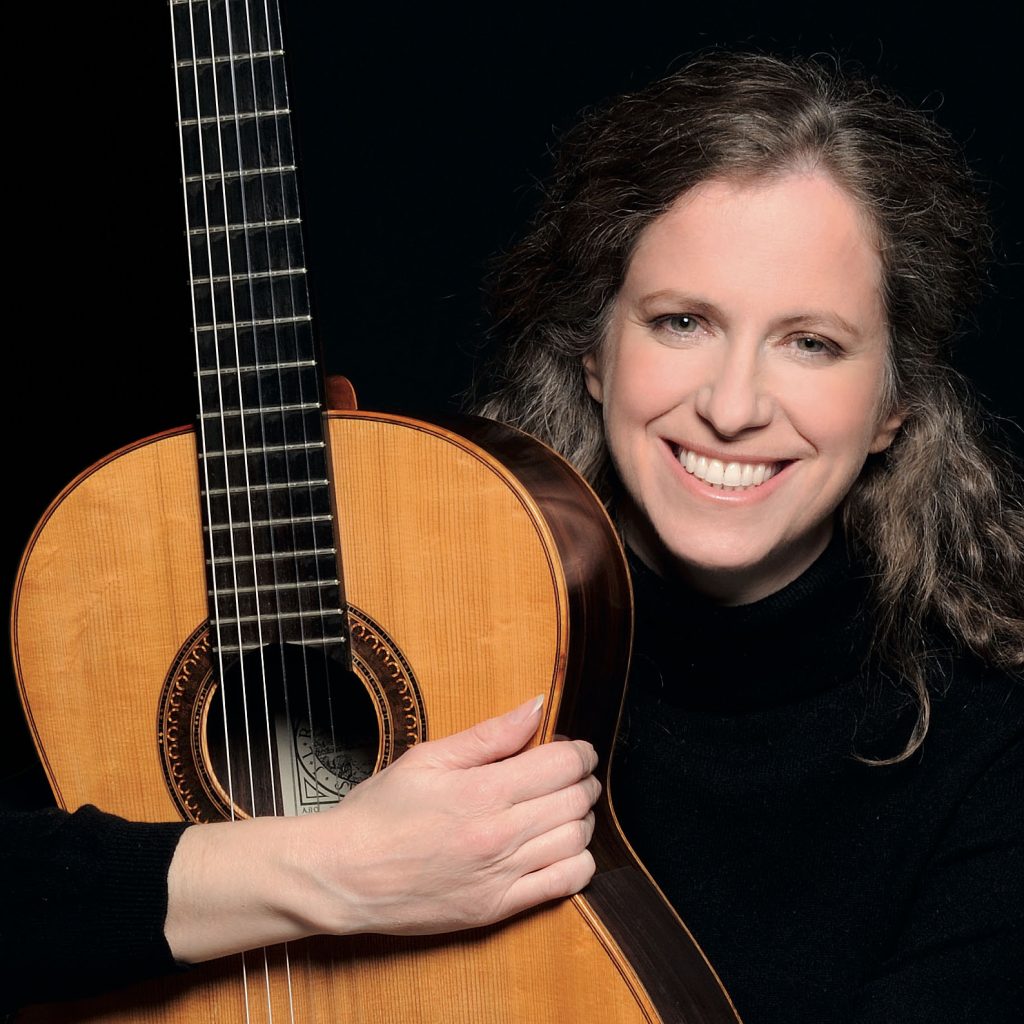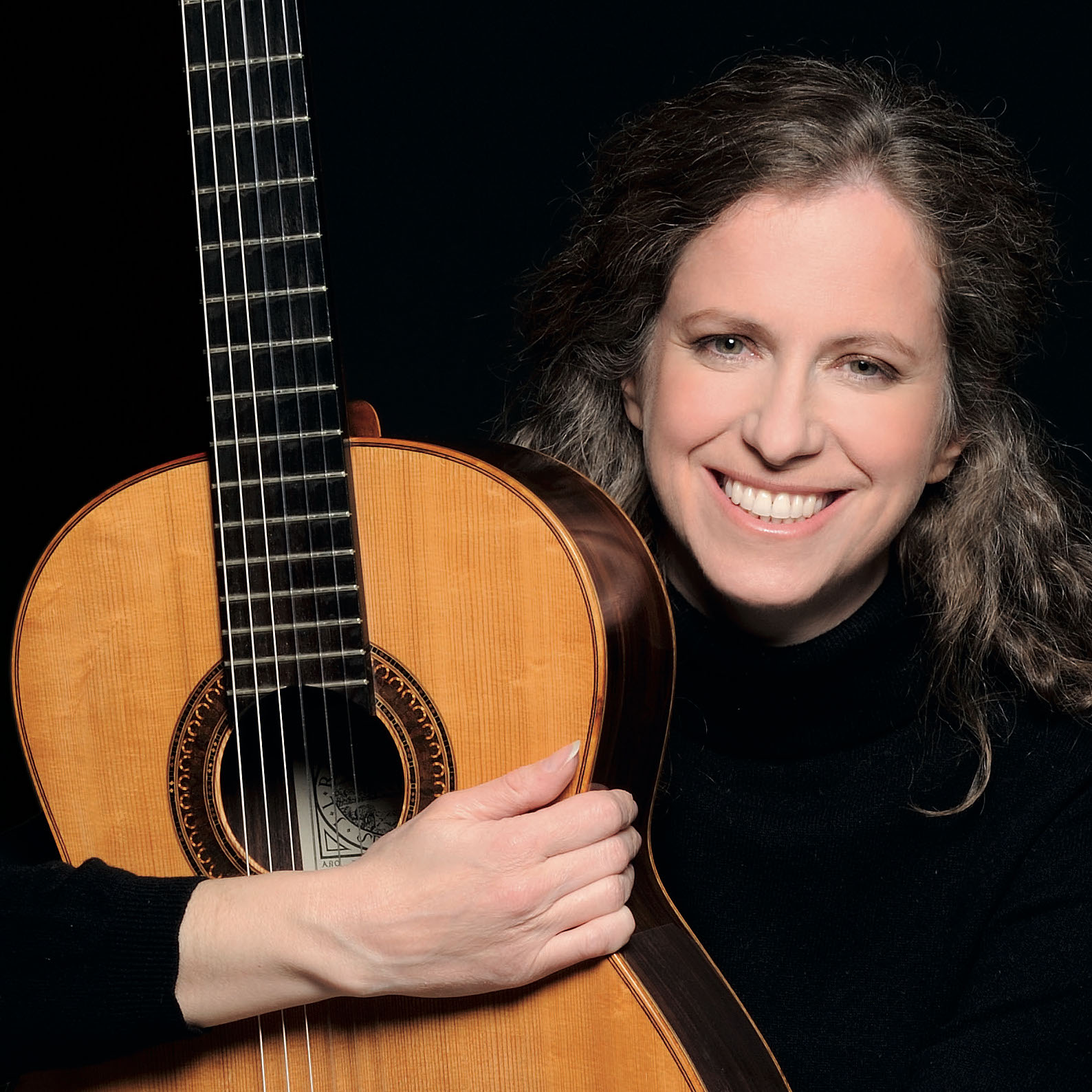
Chitarra Classica – Intervista a Elena Papandreou
Elena Papandreou è nata ad Atene il 7 marzo 1966. Ha studiato chitarra con Evangelos Boudounis (con il quale si è diplomata nel 1985 al Conservatorio Nazionale con il massimo dei voti) e con Oscar Ghiglia. Ha anche studiato con Gordon Crosskey al Royal Northern College of Music in Inghilterra, con una borsa di studio del British Council, ottenendo il Diploma in Advanced Studies in Musical Performance (1986). Ha suonato nelle masterclass di Alirio Diaz, Julian Bream, Leo Brouwer e Ruggero Chiesa.
Ha vinto il Primo Premio in tre Concorsi Internazionali, “Maria Callas” (Grecia 1984), “Gargnano” (Italia 1985), “Alessandria” (Italia 1985) e il Secondo Premio al Concorso “Guitar Foundation of America” (1995 ) In quest’ultima è stata anche insignita del Premio “NAXOS” che le ha dato l’opportunità di registrare due CD personali con questa compagnia. In passato aveva pubblicato altri cinque dischi mentre ora collabora con la BIS svedese dove ha inciso tre CD (musica di Roland Dyens e di Nikita Koshkin). Nel 1992 è stata insignita dall’Accademia di Atene del Premio “Spyros Motsenigos”, un premio importantissimo che viene assegnato a un artista eccezionale ogni due anni.
Elena Papandreou si è esibita nella maggior parte dei paesi europei, nonché negli Stati Uniti, Canada, Venezuela, Porto Rico, Brasile, Messico, Colombia, Cina, Taiwan, Corea del Sud e Giappone. Nell’ambito del programma “Rising Stars” della “European Concert Hall Organisation”, ha tenuto concerti in alcune delle sale più prestigiose d’Europa, il Musikverein di Vienna, la Koelner Philharmonie, la Birmingham Symphony Hall e la Athens Concert Hall. Ha anche suonato alla Tchaikovsky Concert Hall di Mosca e alla Queen Elisabeth Hall di Londra. Nel 1998 ha debuttato alla Carnegie Hall di New York.
Ha collaborato con musicisti di spicco, tra cui i chitarristi Oscar Ghiglia, Alirio Diaz, Roland Dyens, Nikita Koshkin, Evangelos Boudounis, il violinista Leonidas Kavakos e il violoncellista Leonid Gorokhov. Elena Papandreou ha suonato come solista con le Orchestre di Stato di Atene e Salonicco, l’Orchestra della Camerata, l’Orchestra dei Colori, l’Orchestra di Patrasso, l’Orchestra di Alessandria, l’Italia, l’Orchestra da Camera di Istanbul, la Filarmonica di Bucarest, l’Orchestra Sinfonica di Singapore , l’orchestra ESMDM di Monterrey in Messico e con direttori come Daniele Gatti, Lan Shui, Paul Chiang, Cristian Mandeal, Miltos Logiadis, Vassilis Christopoulos ecc.
Le sue esibizioni sono state registrate dalla televisione e dalla radio greca, da Radio France, dalla Deutsche Welle e dalla televisione turca.
E’ professoressa all’Università della Macedonia a Salonicco e insegna nel corso estivo degli Incontri Chitarristici di Gargnano, in Italia, insieme a Oscar Ghiglia.
Diversi compositori le hanno dedicato opere: Leo Brouwer, Roland Dyens, Nikita Koshkin (tra cui un concerto per chitarra e orchestra), Nikos Mamangakis (tra cui un concerto per chitarra e orchestra), Giorgos Koumendakis, Evangelos Boudounis e altri.
Per le sue interpretazioni ha ricevuto commenti elogiativi da personalità significative del mondo della musica e recensioni entusiastiche dalla stampa in Grecia e all’estero. Leo Brouwer ha detto di lei: “Se vuoi ascoltare musica di altissimo livello interpretativo con perfezione poetica devi ascoltare Elena Papandreou” e nel 2020 le ha dedicato il suo lavoro “Preludio de la Nostalgia”. Il Washington Post l’ha definita “una poetessa della chitarra” e il quotidiano greco “Ta Nea” ha scritto: “Ora vediamo Elena Papandreou come una delle più grandi interpreti […] il critico tace… quando la Musica inizia”.
W.M.: Grazie per la disponibilità dedicata ai lettori della rivista WeeklyMagazine.
Inizierò con il chiederti dei tuoi inizi musicali e perché la chitarra.
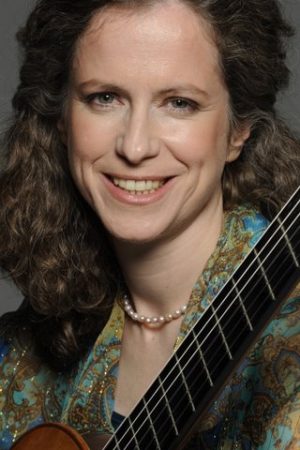 E.P.: anche io ti ringrazio per questa intervista.
E.P.: anche io ti ringrazio per questa intervista.
Quando avevo un po’ meno di otto anni, vivevo in una piccola città vicino ad Atene, dove un professore di musica insegnava quasi tutti gli strumenti! Piano, chitarra, violino, anche… balalaika! Ma quella era la sola possibilità per cominciare in quella città. La mia mamma aveva l’idea che io, insieme a mia sorella, cominciassimo ad imparare uno strumento, o anche … due! Non ero io che avevo questa idea, perché credo che, essendo molto piccola, non avevo ancora visto nessuno suonare da vicino. Ho cominciato la chitarra e il pianoforte. Alla lezione di pianoforte eravamo tre ragazze, mia sorella, un’amica nostra ed io. Io suonavo ai tasti più acuti! Forse non mi piaceva questo suono, o forse era perché quando si arrabbiava, il maestro picchiava le nostre mani sulla tastiera, ed oltre al fastidio, il dolore e la rabbia che ci causava, ci faceva sentire un brutto … “cluster” causato dalle nostre dita schiacciate contro la tastiera! Allora, decisi di lasciare il pianoforte, e continuare solo la chitarra. Almeno là, facevo lezione da sola, con un suono più o meno normale e senza clusters!
Quando avevo 12 anni, i miei genitori decisero di chiedere anche un’altra opinione, perché vedevano che non studiavo tanto… Forse non mi interessava così tanto la musica. Mi portarono da una famosa pianista greca che era per fortuna amica della nostra famiglia, e lei, insieme a suo fratello (anche lui famoso pianista e musicologo) le consigliarono di cambiare maestro e le proposero Evangelos Boudounis.
Con Boudounis, la mia vita musicale cambiò totalmente. Era il maestro più vicino a quello di cui avevo bisogno a quell’età. Mise basi concrete di tecnica (una cosa molto importante per un giovane), era molto esigente e perfezionista. E mi convinse a studiare tanto. D’altra parte, mi lasciava abbastanza libera quanto alla interpretazione.
In aggiunta, a casa nostra, mio papà ascoltava tanta musica classica (non solo chitarra per fortuna!), e così, nei miei orecchi si maturava gradualmente il modo in cui potevo esprimermi con la chitarra. Anche mio papà era un perfezionista come Boudounis, e infine lo sono diventata anch’io!
Non fui io a scegliere la chitarra, fu … lei che scelse me! E credo che in una prossima vita, farò la stessa cosa.
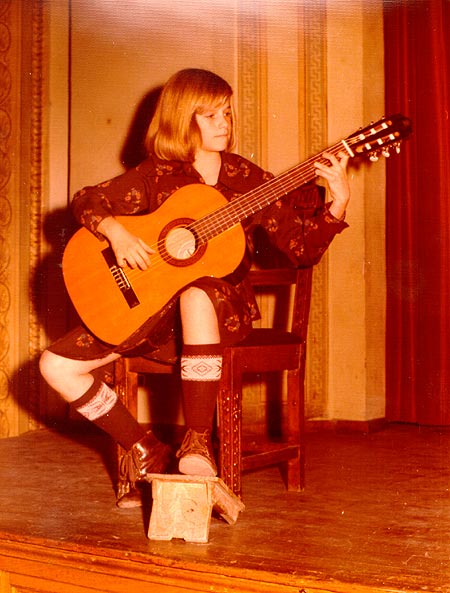
Elena Papandreou a 10 anni
W.M.: Successivamente hai avuto altri maestri, in che modo hanno contribuito alla tua formazione? Ci racconti?
E.P.: La prima volta che suonai in una master-class, fu nel 1983 per Oscar Ghiglia ad Atene. Avevo 17 anni. Da allora, ho suonato tante volte per Oscar (ci siamo eventualmente messi insieme molto dopo, nel 2001), anche lui mi ha cambiato di nuovo la vita musicale. Il modo di sentire, il modo di pensare e di organizzare la mia interpretazione; il modo di insegnare ai miei allievi. Boudounis e Ghiglia sono due maestri molto diversi, ma si completano a vicenda. L’insegnamento dell’uno, non sarebbe lo stesso per me, senza quello dell’altro.
A parte loro, ho avuto lezioni con Alirio Diaz, Julian Bream, Leo Brouwer, Ruggero Chiesa, e ricordo cose importanti di tutti loro. E, sempre, quando ascolto qualsiasi maestro insegnare altri strumenti a parte la chitarra, sempre imparo qualcosa. Tutto questo mi ha aiutato tantissimo, sia come concertista che come insegnante.
W.M.: La scuola chitarristica “greca”: differenze rispetto alle altre.
E.P.: in Grecia abbiamo tantissima chitarra, e ci sono tanti chitarristi di alto livello, alcuni fanno carriere internazionali importanti. Non potrei dire che c’è un solo tipo di scuola in Grecia, ci sono diversi insegnanti, con diverse priorità, come dappertutto. Ma certo che siamo una dei paesi dove i chitarristi sono di un livello superiore.
W.M.: Ci parli della tua attività didattica?
E.P.: come ho detto prima, da tutti gli insegnanti che ho seguito, ho imparato veramente tanto, che uso anche con i miei allievi. L’insegnamento mi è piaciuto dall’inizio, tanto quanto mi piace suonare. Sto insegnando dal 1986, prima nel Conservatori (che in Grecia hanno caratteristiche e una struttura diverse dai Conservatori Italiani) e dal 2005 all’ “Università della Macedonia”, a Salonicco (che è più o meno come sono oggi i conservatori Italiani al livello di Triennio e Biennio).
Sono molto orgogliosa di affermare, che alcuni tra i miei allievi di questi 36 anni, sono già fra i migliori chitarristi nel mio paese, ed alcuni fanno strada anche fuori dalla Grecia. Provo sempre a dar loro, tutto quello che posso, per portarli ad un livello elevato, e dar loro la possibilità di essere felici e soddisfatti della loro vita professionale.
Finalmente, ho insegnato in tantissime master-class in quasi 40 paesi del mondo, e ho incontrato centinaia di bravissimi allievi dappertutto.

2004 – Il M° Oscar Ghiglia ed Elena Papandreou a Mantova
W.M.: Ci parli della tua attività concertistica, dei progetti musicali che hai in cantiere?
E.P.: siamo ancora nella famosa pandemia del Covid-19. Avere tanti progetti musicali è un eroismo che io non posseggo! Perché, un momento organizzi qualcosa, l’altro momento è impossibile realizzarlo. Quello però che sono riuscita a fare, è la registrazione di un nuovo disco, che sarà pubblicato su Super-audio CD dalla BIS (la prestigiosa compagnia di dischi svedese) il dicembre 2022 o il gennaio 2023. Per me, registrare un disco è la cosa più difficile di tutte. Essendo una perfezionista quasi … pazza, diventa un incubo! Perché ogni nota la sento come se vedessi una piccola cosa, con una lente d’ingrandimento enorme!
Questo progetto è cominciato da una idea che avevamo insieme a mio carissimo amico Roland Dyens nel 2016. Sarebbe un disco intero con arrangiamenti di canzoni del famoso compositore greco Manos Hadjidakis. Roland avrebbe fatto gli arrangiamenti ed io la registrazione.
Manos Hadjidakis (1925-1994) ha composto tantissime canzoni e anche molta musica per film, in Grecia è famosissimo, ed io lo amo veramente tanto. Era una persona eccezionale, una delle personalità che hanno cambiato la storia musicale della Grecia. Fuori dalla Grecia, è diventato molto famoso con la musica per il film “Mai di Domenica” di Jules Dassin con Melina Merkuri. La famosa canzone di quel film, ha vinto l’Oscar per la “migliore canzone originale” nel 1960.
Roland aveva già arrangiato magnificamente due canzoni di Hadjidakis, anni prima del 2016, e sempre avrebbe voluto continuare, ma per alcuni motivi il suo progetto si spostava più avanti. Purtroppo, quello stesso anno che facemmo questo bellissimo progetto per il disco, il nostro caro Roland è mancato senza poter continuare a fare altri arrangiamenti. Però, mi sento molto fortunata, perché un caro allievo di Roland, il bravissimo chitarrista greco Orestis Kalampalikis, ha continuato il progetto, con arrangiamenti veramente magnifici, allo stesso livello di come faceva Roland, che (come tanti nel mondo della chitarra lo crediamo) era il migliore arrangiatore per chitarra. Abbiamo lavorato tantissimo con Orestis tutti questi anni, e sono molto lieta di dire che nel febbraio scorso, ho registrato finalmente il disco intero a Berlino. “Last but not least”: il leggendario compositore cubano Leo Brouwer, nel 2020 ha composto un nuovo pezzo dedicato a me, ispirato da una ninna nanna di Hadjidakis. Il pezzo di Brouwer si chiama “Preludio de la Nostalgia”.
Tutti i pezzi del CD sono dedicati a me e saranno prime registrazioni assolute.
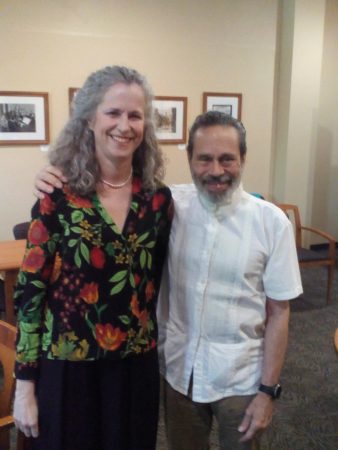
Elena Papandreou con Leo Brouwer
W.M.: Come vedi il futuro della chitarra?
E.P.: la domanda potrebbe essere, come vedo il… futuro! Troppe cose brutte, speriamo che non andiamo verso una terza guerra mondiale, speriamo che la prossima pandemia non sarà troppo vicino, distruggiamo nostro pianeta ogni giorno di più, e parlare di chitarra mi sembra un lusso. Però, voglio sempre essere ottimista, la vita continua, l’arte è sempre un elemento molto importante e fondamentale, i chitarristi diventano più e più bravi, come succede con tutte le cose.
Lo so che i giovani anno tanta ansia per il loro futuro, e posso dire loro: se ami quello che fai, sei già fortunato, e se lavori tanto, c’è sempre un modo di continuare, e forse anche fare tante belle cose. Tutto è difficile, ma se ami questo che fai, avrai più forza per andare avanti. Posso anche aggiungere i consigli di farsi amici veri, di essere generosi con gli altri, di essere sinceri e giusti. E lavorare tanto.
W.M.: Nell’ambito della liuteria chitarristica c’è stata una grande evoluzione. Ciò ha determinato la creazione di strumenti sempre più performanti. Verso che tipologia di strumenti ti senti particolarmente attratta? Preferisci la costruzione in abete o cedro?
E.P.: ho suonato tanti anni con chitarre di abete, e pensavo che sarebbe per me l’unico tipo. Eventualmente, ho suonato tanto anche con cedro. Apprezzo i buoni elementi di tutti due tipi. Ho fatto la registrazione del CD con la mia cara “La Añorada” di Jose-Luis Romanillos (gli stessi giorni che purtroppo ci è mancato), ho suonato tanto con una buonissima chitarra di liutaio greco Pavlos Gypas (fatta con cedro), e anche con una bellissima Fleta di Oscar, che mi ha regalato qualche anno fa!
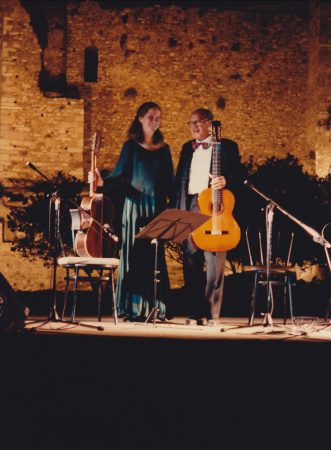
1997 – In concerto con Alirio Diaz a Patras
W.M.: Quanto tempo dedichi allo studio della chitarra?
E.P.: ultimamente purtroppo non così tanto. Troppe cose da fare, l’insegnamento prende una grande parte del mio tempo. Ma fino a quando ho avuto più o meno trent’anni, ho lavorato sette ore al giorno! Non dico che suonavo per sette ore, ma era in totale il lavoro che facevo con la chitarra. Col lavoro di quegli anni, ho formato il mio carattere chitarristico, la mia tecnica solida, il mio modo di suonare. Posso dire che anche oggi, sto bene con la chitarra, grazie al lavoro che avevo fatto quegli anni. Per questo consiglio ai miei allievi di lavorare tanto anche loro.
W.M.: Essere la moglie di Oscar: pro e contro.
E.P.: Ha ha, mi piace il “pro e contro”! Il problema è che Oscar leggerà questa intervista, allora come posso scrivere i… “contro” se non voglio litigare dopo? In ogni caso, i “contro” glie li dico a casa, e mi pare che si sia già stufato di sentirli! Proverò con i “pro” allora!
Oscar che conosce bene il mestiere che facciamo, tollera le particolarità di questo lavoro, che forse, un uomo che non è artista o musicista, non capirà facilmente. Abbiamo lo stesso gusto per la musica, e scherziamo tanto. Sarebbe molto difficile per me, essere con qualcuno senza il senso del “humor”! Ci piace guardare film insieme, con una preferenza per i … cartoni animati!
Come ho detto prima, Oscar mi ha influenzato tantissimo come musicista, e fino ad oggi, studiare nella stessa casa dove c’è Oscar Ghiglia, mi fa cercare di suonare in un modo che piacerà anche a lui, una cosa non facile, perché il suo livello intero di comprensione musicale, e tra i più alti del mondo! È molto importante per un artista, avere sempre vicino delle persone che chiedono tanto.
Siamo tutti e due caratteri forti e questo non è tanto facile. Ok, prima che passo ai “contro”, mi fermo qui!
W.M.: Siamo giunti alla fine di questa bella e simpatica intervista, rinnovo i ringraziamenti a te ed a Oscar per la disponibilità e per la gioia che mi avete dato: I sogni possono avverarsi, tanta buona musica.
E.P.: Tante grazie anche a te per la intervista!
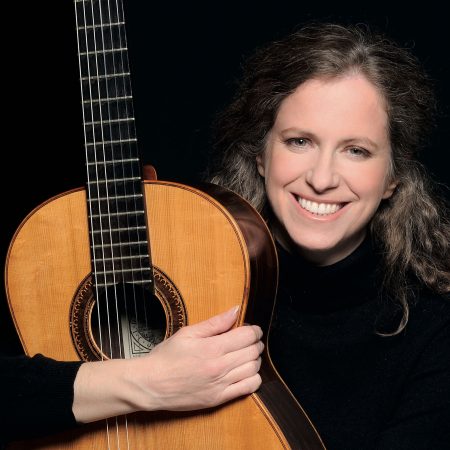
Elena Papandreou, “a poet of the guitar” according to The Washington Post, was born in Athens in 1966. She studied the guitar with Evangelos Boudounis and with Oscar Ghiglia. She also studied with Gordon Crosskey at the RNCM, England, on a British Council scholarship and played in master classes of Alirio Diaz, Julian Bream, Leo Brouwer and Ruggero Chiesa.
She has won the First Prize in three International Competitions, “Maria Callas” (Greece 1984), “Gargnano” (Italy 1985), “Alessandria” (Italy 1985) as well as the Second Prize and the “NAXOS” Prize in the “Guitar Foundation of America” Competition (USA 1995). Currently she collaborates with Swedish BIS record company. In 1992 she was honoured by the Academy of Athens with the “Spyros Motsenigos” Prize, an important prize awarded every two years to an outstanding musician.
Papandreou has performed in around 40 countries in Europe, North and South America and Asia. Within the “Rising Stars” program of the “European Concert Hall Organisation”, she gave concerts in some of the most prestigious halls in Europe, the Vienna Musikverein, the Koelner Philharmonie, the Birmingham Symphony Hall and the Athens Concert Hall. She has also played in the Tchaikovsky Concert Hall in Moscow and the Queen Elisabeth Hall in London. In 1998 she gave her debut in Carnegie Hall (Weill Recital Hall) in New York.
She has collaborated with outstanding musicians, among which, the guitarists Oscar Ghiglia, Alirio Diaz, Roland Dyens, Nikita Koshkin, Evangelos Boudounis, the violinist Leonidas Kavakos and the cellist Leonid Gorokhov. Papandreou has played as a soloist with orchestras in Greece, Italy, Romania, Turkey, Mexico and Singapore and conductors such as Daniele Gatti, Lan Shui, Paul Chiang, Cristian Mandeal, Miltos Logiadis, Vassilis Christopoulos etc.
Composers who have dedicated works to her are Leo Brouwer, Roland Dyens, Nikita Koshkin, Nikos Mamangakis, Giorgos Koumendakis and Evangelos Boudounis.
Elena Papandreou is a professor in the University of Macedonia in Thessaloniki, Greece.
W.M .: Thanks for the availability dedicated to the readers of the WeeklyMagazine.
I’ll start by asking you about your musical beginnings and why the guitar.
 E.P .: I also thank you for this interview.
E.P .: I also thank you for this interview.
When I was a little under eight, I lived in a small town near Athens, where a music teacher taught almost all instruments! Piano, guitar, violin, even… balalaika! But that was the only chance to start in that town. My mom had the idea that I, together with my sister, were starting to learn an instrument, or even … two! It wasn’t me who had this idea, I have the impression that, being very young, I had not yet seen anyone play live. I started learning the guitar and the piano. At the piano lessons, we were three girls, my sister, a friend of ours and me. I played on the higher key register! Maybe I didn’t like this sound, or maybe it was because, when he got angry, the teacher beat our hands on the keyboard, and in addition to the nuisance, pain and anger it caused us, a terrible … “cluster” was heard, caused by our fingers when hit against the keyboard! So, I decided to quit the piano and just continue with the guitar. At least there, I was taught alone, with a more or less normal sound and without clusters!
When I was 12, my parents decided to ask for another opinion as well, because they saw that I didn’t study so much … Maybe I wasn’t so interested in music. They took me to a famous Greek pianist who was fortunately a friend of our family, and she, together with her brother (also a famous pianist and musicologist) advised that I change teacher and proposed Evangelos Boudounis.
With Boudounis, my musical life totally changed. He was the closest teacher to what I needed at that age. He laid a concrete foundation of technique (a very important thing for a young person), he was very demanding and a perfectionist. And he convinced me to practise a lot. On the other hand, he allowed me a lot of freedom, concerning interpretation.
In addition, in our home, my dad listened to a lot of classical music (luckily, not just guitar!). Therefore, in my ears, the way I could express myself on the guitar gradually matured. My dad was also a perfectionist like Boudounis, and in the end I became one too!
It wasn’t me who chose the guitar, it was … she who chose me! And I believe that in a next life, I would do the same thing.

Elena Papandreou 10 years old
W.M .: Later you had other teachers, who contributed to your training. Can you tell us?
E.P .: The first time I played in a master-class was in 1983 for Oscar Ghiglia in Athens. I was 17. Since then, I’ve played for Oscar many times (we eventually got to be together much later, in 2001), he too changed my musical life again. The way I listen, the way I think and organize my interpretation; the way to teach my students. Boudounis and Ghiglia are two very different teachers, but they complement each other. The teaching of one would not be the same for me, without that of the other.
Aside from them, I have had lessons with Alirio Diaz, Julian Bream, Leo Brouwer, Ruggero Chiesa, and I remember important things that I heard from all of them. And, whenever I listen to any teacher teaching other instruments besides the guitar, I always learn something. All this has helped me a lot, both as a concert performer, as well as a teacher.
W.M .: The “Greek” guitar school: differences from the others.
E.P .: in Greece we have a lot of guitar, and there are many high level guitarists, some with important international careers. I could not say that there is only one type of school in Greece, there are different teachers, with different priorities, like everywhere. But of course we are one of the countries where guitarists are of a higher level.
W.M .: Can you tell us about your teaching activity?
E.P .: as I said before, from all the teachers I have followed, I have learned a lot, which I also use with my students. I liked teaching from the beginning, as much as I like playing. I have been teaching since 1986, first in the Conservatories (which in Greece have different characteristics and structure from the Italian Conservatories) and since 2005 at the “University of Macedonia”, in Thessaloniki (which is more or less how Italian conservatories are today at the level of Triennium and Biennium).
I am very proud to say that some of my students of these 36 years are already among the best guitarists in my country, and some are also making their way outside of Greece. I always try to give them everything I can, in order to bring them to a high level and give them the chance to be happy and satisfied with their professional life.
Finally, I have taught in countless master-classes in nearly 40 countries around the world, and have met hundreds of talented students all over the world.

2004 – M° Oscar Ghiglia and Elena Papandreou in Mantova
W.M .: Can you tell us about your concert activity, about the musical projects you have in the making?
E.P .: we are still in the famous Covid-19 pandemic. Having many musical projects is a heroism that I don’t possess! Because, one moment you organize something, the other moment it is impossible to make it happen. What I managed to do, however, is the recording of a new disc, which will be released on Super-audio CD by BIS (the prestigious Swedish record company) in December 2022 or January 2023. For me, recording a disc is the most difficult thing of all. Being an almost… crazy perfectionist, it becomes a nightmare! Because it is for every note, as if I see a little thing, with a huge magnifying glass!
This project started from an idea we had with my very dear friend Roland Dyens in 2016. It would be a whole disc with arrangements of songs by the famous Greek composer Manos Hadjidakis. Roland would do the arrangements and I would do the recording.
Manos Hadjidakis (1925-1994) has composed many songs and also a lot of music for films, in Greece he is very famous, and I love him very much. He was an exceptional person, one of the personalities who changed the musical history of Greece. Outside of Greece, he became very famous with the music for Jules Dassin’s film “Never on Sunday” with Melina Merkuri. The famous song from that movie won the Oscar for “Best Original Song” in 1960.
Roland had already beautifully arranged two Hadjidakis songs, years before 2016, and always wanted to continue, but for some reasons this idea of his, never moved further. Unfortunately, that same year that we planned this beautiful project for the record, our dear Roland passed away without being able to continue making any more arrangements. However, I feel very lucky, because a dear student of Roland, the very good Greek guitarist Orestis Kalampalikis, continued the project, with truly magnificent arrangements, at the same level as Roland did, who (like so many of us in the guitar world believe) was the best arranger for guitar. We have worked a lot with Orestis all these years, and I am very pleased to say that last February, I finally recorded the whole album in Berlin. Last but not least: the legendary Cuban composer Leo Brouwer, in 2020 composed a new piece dedicated to me, inspired by a lullaby by Hadjidakis. Brouwer’s piece is called “Preludio de la Nostalgia”.
All the pieces on the CD are dedicated to me and will be world first recordings.

Elena Papandreou with Leo Brouwer
W.M .: How do you see the future of the guitar?
E.P .: the question might be, how do I see the… future! Too many bad things, let’s hope we don’t go towards a third world war, let’s hope the next pandemic won’t be too close, we destroy our planet every day, and talking about guitar seems like a luxury to me. However, I always want to be optimistic, life goes on, art is always a very important and fundamental element, guitarists become better and better, as happens with all things.
I know that young people are so anxious about their future, and I can tell them: if you love what you do, you are already lucky, and if you work hard, there is always a way to continue, and perhaps even do many beautiful things. Everything is difficult, but if you love what you do, you will have more strength in order to carry on. I can also add a bit more of advice: to make true friends, to be generous with others, to be sincere and fair. And to work a lot.
W.M .: There has been a great evolution in the field of guitar making. This has led to the creation of increasingly performing tools. Which type of instruments do you feel particularly attracted to? Do you prefer spruce or cedar construction?
E.P .: I have played for many years with spruce guitars, and I thought that this would be the only type for me. Eventually, I also played a lot with cedar. I appreciate the good elements of both types. I did the Hadjidakis CD recording with my dear “La Añorada” by Jose-Luis Romanillos (during the very days that he unfortunately passed away), I played a lot with a very good guitar of Greek luthier Pavlos Gypas (made with cedar), and also with the beautiful Fleta of Oscar (with which he recorded his incomparable Ponce CD), which he gave me as a gift a few years ago!

1997 – In concert with Alirio Diaz in Patras
W.M .: How much time do you spend studying the guitar?
E.P .: unfortunately not so much lately. Too many things to do, teaching takes up a large part of my time. But until I was around thirty, I used to practise seven hours a day! I’m not saying that I actually played for seven hours, but it was the total work I was doing with the guitar. With the work of those years, I formed my musical personality, my solid technique, my way of playing. I can say that, even today, I’m doing well with the guitar, thanks to the work I had done in those years. This is why I advise my students to work hard too.
W.M .: Being Oscar’s wife: pros and cons.
E.P .: Ha ha, I like the “pros and cons”! The problem is that Oscar will read this interview, so how can I write the… “cons” if I don’t want to fight afterwards? In any case, I tell him the “cons” at home, and it seems to me that he is already tired of hearing them! I’ll try the “pros” then!
Oscar, who knows our profession well, tolerates the particularities of this work, which perhaps a man who is not an artist or a musician, will not easily understand. We have the same taste for music, and we joke a lot. It would be very difficult for me to be with someone without a sense of “humour”! We like to watch movies together, with a preference for… cartoons!
As I said before, Oscar has influenced me a lot as a musician, and to this day, practising in the same home where Oscar Ghiglia lives, makes me try to play in a way that he will also appreciate, something not easy, because his overall level of musical understanding is among the highest in the world! It is very important for an artist to always have close by, people who are demanding.
We are both strong characters and this is not so easy. Ok, before I move on to the “cons”, I better stop here!
W.M .: We have reached the end of this beautiful and nice interview, I renew my thanks to you and to Oscar for the availability and the joy you have given me: Dreams can come true, (I wish you) lots of good music.
E.P .: Many thanks to you too for the interview!
